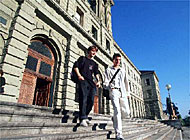Scientists fight brain drain

Switzerland's leading scientific research centres are tackling the problem of brain drain, particularly the tendency of young academics to take up positions in the United States.
The Federal Institutes of Technology in Zurich and Lausanne have designed a new career package which offers the possibility of a professorship at 30.
Scientists can now develop their academic careers in a stable research environment by becoming assistant professors with tenure track. The aim is to foster talent and strengthen the Swiss research scene.
“It’s patterned on the American system,” explains Professor Olaf Kübler, president of the Zurich Institute. “The initial appointment is for three years with the option to extend it for another three years.
“The tenure decision is made by the end of the fifth year. If everything goes well, it’s a full professorship after five years. If tenure is not awarded then at least there’s a year available to look for a place elsewhere.”
Nenad Ban from Croatia is a good example of the international nature of academia today. He studied molecular biology at the university of Zagreb, continued his education in the United States and is now assistant professor in structural molecular biology in Zurich.
He says that by offering resources, laboratory space and full autonomy, the project benefits both the individual and the university.
“For assistant professors, the scheme is very good because it gives them the opportunity to become internationally renowned in their field of research and to publish papers under their own name and establish their reputations.
“For the university, there are also advantages. This sort of distribution of funds which is being chanelled towards assistant professors who have to achieve very high results in order to get tenured, means that these funds are well invested. The investment is going to be returned with high yield in the end.”
The investment in an assistant professorship for the full six years is estimated to be about SFr3.5 million. The money will come out of the Institutes’ existing budget.
It is predicted that 70 per cent of assistant professors with tenure tract will attain full professorships. Zurich currently has 49 assistant professors and is aiming for 100 by 2005, Lausanne with 14 is aiming for 40 by 2004.
Pierre Vandergheyns from Belgium, an associate professor with tenure track at the Federal Institute of Technology in Lausanne, says he hopes other European countries will follow Switzerland’s lead.
“If only the system could be introduced in other European countries, it could help keep young researchers in Europe. If you want to promote the quality of European research and keep the young brains here, you have to give them the opportunity to stay within a stable research environment.”
by Vincent Landon

In compliance with the JTI standards
More: SWI swissinfo.ch certified by the Journalism Trust Initiative
You can find an overview of ongoing debates with our journalists here . Please join us!
If you want to start a conversation about a topic raised in this article or want to report factual errors, email us at english@swissinfo.ch.